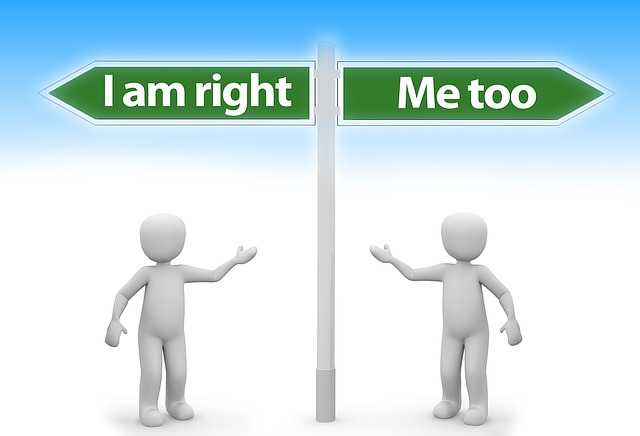Innocence refers to a lack of guilt or wrongdoing, while ignorance refers to a lack of knowledge or understanding. Innocence can be a positive trait, while ignorance is generally considered negative and can lead to mistakes or misunderstandings.
The definition of innocence
(Photo by cottonbro studio: )

Innocence refers to the state or quality of being free from wrongdoing, guilt, or sin. It can also refer to a lack of experience or knowledge, particularly in the context of the negative aspects of the world or human behavior. Innocence is often associated with purity, simplicity, and naivete.
The definition of ignorance
(Image by Gerd Altmann from Pixabay )

Ignorance refers to a lack of knowledge, understanding, or awareness about a particular subject or situation. It can arise from a variety of factors, including a lack of education or exposure, or a refusal to consider new information. Ignorance can lead to misunderstandings, mistakes, and prejudice.
Innocence is defined as the quality or state of being free from guilt, sin, or moral wrong. Ignorance, on the other hand, is the lack of knowledge, understanding, or education.
Innocence is often viewed as a positive quality, while ignorance is often seen as negative. An innocent person is someone who has not committed a crime or done anything wrong. An ignorant person is someone who lacks knowledge or understanding.
When we talk about innocence, we are talking about a lack of knowledge or experience. Ignorance, on the other hand, is a lack of understanding. Both can lead to problems, but ignorance is often seen as more dangerous because it can prevent people from learning and growing.
Innocence can be charming, but it can also be frustrating. When you’re dealing with someone who is innocent, you might have to explain things more than you’d like. And because they don’t have a lot of experience, they might not understand why certain things are important.
Ignorance, on the other hand, can be dangerous. If someone is ignorant of the consequences of their actions, they might do something that hurts themselves or others. And if they’re unwilling to learn new information, they’ll never be able to improve their situation.
Innocence and ignorance are both problems that can lead to negative consequences. But ignorance is often seen as more dangerous because it can prevent people from learning and growing.
Innocence and ignorance are not always mutually exclusive. It is possible to be both innocent and ignorant. For example, a child who has not been taught about the dangers of drugs may be considered both innocent and ignorant if they use them anyway.
Examples of innocence
When we think of the word “innocence,” we may think of children or babies. They have not yet experienced the world and its dangers, so they are considered innocent. Another example of innocence is when someone is unaware of something harmful or wrong. For example, if you grew up in a small town and never left, you may be innocent of the crime that exists in big cities. Innocence can also refer to being naïve or gullible.
Examples of ignorance
There are many examples of ignorance in the world. One example is when people believe that only their own culture and way of life is the correct way, and all others are wrong. This is often seen in conflicts between different groups of people, where each side is convinced that they are right and the other is wrong. Another example of ignorance is when people refuse to learn about or accept new ideas, even if there is evidence that these ideas are true. This can be seen in people who deny the science behind climate change, or who refuse to believe that certain races or genders are equal. Ignorance can also be exhibited in a lack of understanding or knowledge about something. For example, someone may be ignorant of history and not know anything about the Holocaust or other atrocities that have occurred throughout the world.
Are innocent people ignorant?
It is often said that ignorance is bliss. This may be true in some cases, but it is definitely not true when it comes to innocence. Ignorance can be defined as a lack of knowledge or information. Innocence, on the other hand, is a lack of guilt or wrongdoing. An innocent person is someone who has not been convicted of a crime. So, while an ignorant person may not know what they’re doing is wrong, an innocent person knows they haven’t done anything wrong.
There are many people who are ignorant of the law. They may not know that what they’re doing is illegal. However, this does not make them innocent. If they are caught and charged with a crime, they will be held accountable for their actions. On the other hand, there are people who are innocent because they truly did not know that what they were doing was against the law. In these cases, ignorance can be used as a defense against charges.
It’s important to remember that just because someone is ignorant of the law does not mean they are innocent. And just because someone is innocent does not mean they are ignorant. Innocence and ignorance are two completely different things.
Can a person be both ignorant and innocent Why?
Yes, a person can be both ignorant and innocent. Ignorance is defined as the lack of knowledge or information. innocence is defined as the quality or state of being free from guilt or sin. So, a person can be ignorant of the law and still be innocent if they have not committed a crime.
Is innocence a weakness?
Is innocence a weakness? Many people believe that it is, but there are others who think that innocence is simply a matter of not knowing any better. So, what is the difference between innocence and ignorance?
Ignorance is generally viewed as a negative trait, while innocence is often seen as something positive. Ignorance is lacking knowledge or information, while innocence is being unsullied or untainted. In other words, ignorance is not knowing something that you should know, while innocence is not knowing something because you haven’t had the experience yet.
There are some who would say that innocence is a form of weakness because it means that you are vulnerable to being taken advantage of. However, there are also those who believe that innocence is a strength because it allows you to see the world in a different, more positive light.
At the end of the day, it’s up to each individual to decide whether they believe that innocence is a weakness or a strength. What do you think?
What is ignorant Behaviour?
There are many behaviors’ that can be considered ignorant. Ignorance is often defined as a lack of knowledge or understanding. However, it can also refer to a deliberate choice to remain uninformed about something. This could be due to a fear of the unknown, or a desire to stay comfortable in one’s current situation.
Some ignorant behaviour can be harmless, such as choosing not to learn about a new topic because it doesn’t interest you. However, other types of ignorance can have serious consequences. For example, if someone refuses to learn about another culture because they’re afraid of difference, this can lead to prejudice and bigotry.
If you’re not sure whether a behaviour is ignorant or not, ask yourself whether it’s based on a lack of information or understanding. If so, it’s likely that ignorance is at play.
What are the two types of ignorance?
There are two types of ignorance: willful and innocent. Willful ignorance is a choice. It’s a decision to remain uninformed or misinformed. It’s an act of avoidance. People who willfully ignore the news or facts they don’t like are doing so deliberately. They’re closing their eyes and ears to information that would challenge their beliefs, values, or worldview. Innocent ignorance, on the other hand, is not a choice. It’s simply not knowing something. People who are innocently ignorant may want to know more but don’t have access to the information, or they may not have been exposed to it yet. There’s nothing malicious about innocent ignorance. It’s simply a lack of knowledge.
How to overcome ignorance?
There are many ways that people can overcome ignorance. Some people may seek out knowledge on their own, while others may require guidance from others.
One way to overcome ignorance is by seeking out knowledge. This can be done by reading books, attending classes, or researching information online. When a person takes the time to learn about a subject, they are less likely to be ignorant about it.
Another way to overcome ignorance is to ask questions. When someone does not understand something, they should not be afraid to ask for clarification. By asking questions, people can learn more about a topic and reduce their ignorance.
In some cases, ignorance can be cured simply by exposure to new ideas and perspectives. If someone is only exposed to one way of thinking, they may be ignorant of other viewpoints. However, if they are exposed to different opinions and ideas, they may start to see things in a new light and overcome their ignorance.
What are the characteristics of an ignorant person?
There are many characteristics of an ignorant person, but some of the most common ones are listed below.
- Unwilling to learn new things or accept new ideas
- Close-minded
- Arrogant
- Quick to judge others
- Ignorant people often believe they are always right, and that anyone who disagrees with them is wrong.
- They can be very disrespectful, especially to those who they perceive as being different from them.
- They may also be prejudiced against certain groups of people.
Featured Image By – Photo by Pixabay:








